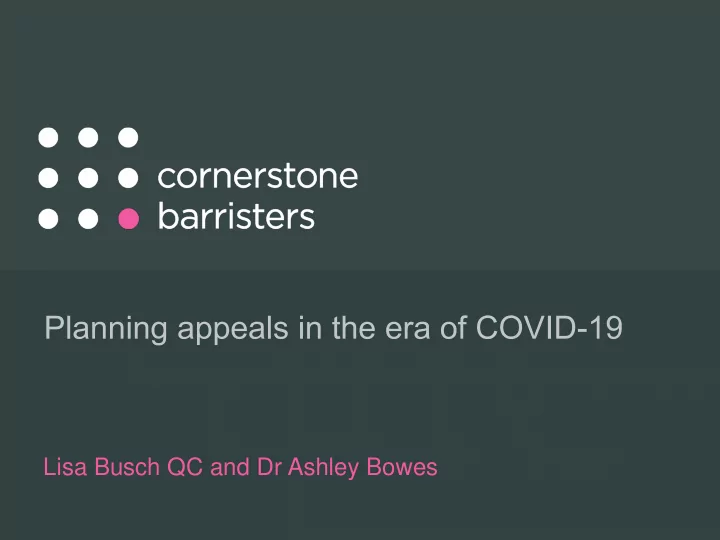

Lisa Busch QC and Dr Ashley Bowes
Introduction by Lisa Busch QC
Fairness and access to justice Why does it matter? • In principle • In practice
The approach of the Courts March 2020 and two differing approaches: • PINS • The Court Service
The approach of the Courts March 2020 and two differing approaches: • PINS • The Court Service
The approach of the Courts • The Court of Appeal • Two appeals from the Family Court • “Exceptional circumstances” required for in - person events
The approach of the Courts Balancing enthusiasm with caution • LCJ announcement • CA cases • Likely similar approach by PINS
Lawyers’ response • Resistance to PINS immediate cancellation • Law Society Committee letter to Robert Jenrik • Suggestions for keeping the system moving
Lawyers’ response As regards appeals, these included: • Written reps • Topics to remote hearings • Extending time limits across the board • Acknowledged potential 3 rd party prejudice
Planning Bar’s Response Emphasised Doody principles: • Presumption of fairness • Standards of fairness not immutable • Fairness is context specific • Statutory scheme is key to context • An opportunity to make representations • Information about gist of case to answer
So … • Representations do not need to be in person to be fair • Remote technology can still ensure fairness • Provided: • Parties informed of opposing case • Have opportunity to make representations
Article 6 ECHR • Planning appeals do determine civil rights • But Article 6 not offended by remote participation • No requirement for in-person attendance
Article 6 Aarhus Convention • “… in writing or, as appropriate, at a public hearing …” • Participation does not need to be in person • Participation via remote technology permissible
Focus on the positive …
Planning Inspectorate Position
The PINS position • All in person site visits, hearings and inquires have been suspended form 17 March. • Rosewell timescales now abandoned as of early May.
The PINS position • Keen to keep things moving via virtual events. • No settled view (although note MS Teams used internally). • Public participation the biggest challenge.
The PINS position • Special challenges not faced by the Courts raised by public participation: • e.g. Kendal v Rochford [2014] EWHC 3866 (Admin) at [94]
What does PINS say? • 1,700 decisions issued since Lockdown • 13 Local Plan letters issued since Lockdown • First appeal determined with virtual site visit 28 April 2020 • First “digital pilot” 11 May 2020 BUT ….
What does PINS say? • 3 months = roll out good practice “widely” • 6 months = fully digital and hybrid events • Graham Stallwood is planning for the long term: • Blended approaches to appeals format • 3D and augmented reality encouraged
Before the Event
What can we expect? • Parties are likely going to be required to assemble a single .pdf document, containing all the core documents which is: • Indexed. • Continuously paginated. • Hyperlinked/bookmarked. • Available on-line.
What can we expect? • Likely sensible for Appellants to take a leading role where possible building documents • Also hosting documents on their own websites • LPAs may need to amend SCI • EIA rules on ES copies (cf. Pipelines Regs)
What can we expect? • Topic specific SoCG and Scott Schedules • Likely need for more than one telephone conference to ensure events run smoothly
During the Event
What can we expect? • Round-table most likely to be prominent over XX • Enforcement appeals likely to be delayed, so time to think creatively. • Topic basis more likely • No set video conference platform but will need document sharing facility (or online library)
What can we expect? • Essential for parties to have a secure means of communicating during the event • Dangers of in-program messaging services • PINS concerned about the “digitally challenged”
After the Event
What can we expect? • Site visits likely to be unaccompanied where possible • Witnesses need to think early about an agreed route, to be shared with third parties
Issues to head-off now
What can we do now? • Surveys and site visits • Risk assessments for site visits • Reg.6(2)(f) Health Protection (Coronavirus Restrictions) (England) Regulations 2020, travelling “for the purposes of work” • See NE guidance on COVID and surveys
What can we do now? • Invest in document building software • Set-up hosting websites in contact with LPA
Concluding thoughts
For instructions and Ask us more questions: enquiries: events@cornerstonebarristers.com elliotl@cornerstonebarristers.com dang@cornerstonebarristers.com samc@cornerstonebarristers.com
Recommend
More recommend